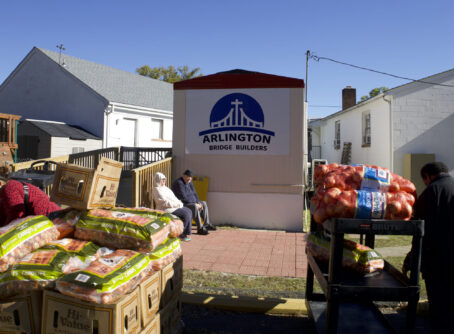
“Blessed are the poor…” my four-year-old croons the lyrics between gasped whispers, barely audible, as if unwilling to bring the full weight of his singing voice to these words until he has mastered each phrase. Meanwhile, my two-year-old daughter takes the exact opposite approach. As I wipe oatmeal from her onesie, she screams in my face: “For their hearts have a road to the kingdom of God / And their souls are the songs of the kingdom of God.”
This is our morning routine. Our common life unfolds over warmed day-old porridge and browning banana slices. We read scripture and sing hymns—both old and new—over breakfast. The hymn “Kingdom of God” by Jon Guerra has become a mainstay. If I’m being honest, this daily rhythm is as much for me as for the children whose physical and spiritual well-being I steward. My daughter’s endless tenacity breaks through my reverie: “Mom, mom, MOMMMMM!”
“YES, Phoebe, how may I help you?” I respond, immediately regretting the sharpness in my tone as the words escape.
“Mom, you sew the songs of the kingdom of God?” She asks.
“Umm,” I repeat her question aloud, processing. “Do you mean, ‘Is my soul the song of the kingdom of God?’ Or do you mean, ‘Do I sew the songs of the kingdom of God?’” I ask, trying to discern whether she’s mispronouncing the words or misunderstanding them. “Yes, that,” she responds, unhesitatingly.
She is only two. Can she truly grasp concepts like the soul or the kingdom of God? I stop myself. After all, Christ himself said that the kingdom of heaven belongs to such as these. Why question my child’s imaginative grasp of the Beatitudes when it’s my understanding that needs questioning? Hers is the souling and the sewing of the songs of the kingdom of God.
“Blessed are the poor in spirit: for theirs is the kingdom of heaven.” This verse, Jesus’ first proclamation in the Sermon on the Mount, resonates within me. These words linger in my mind, still present a quarter-hour later as my husband takes over with the children and I turn to writing this article.
The facts and principles that unfold in the case about homelessness discussed below are complex, but the takeaway is simple: religious organizations that serve the poor—in particular those people without homes—should be recognized as vital contributors in the public square. Unlike secular nonprofits, religious institutions serving the homeless have a dual mission: providing both material and spiritual restoration. Religious homeless shelters don’t only provide physical accommodations to the least among us; they often offer spiritual resources that point to our eternal home in the Kingdom of God. Many of those on the street wish for a connection to Jesus and the presence of caring believers.
A federal appeals court acts as if faith-based shelters are not a valuable resource.
In 2018, the Ninth Circuit federal appeals court addressed a complicated legal argument in Martin v. City of Boise, dealing with Boise, Idaho’s ban on “camping” in public spaces, a measure meant to control encampments of homeless people. The court evaluated the city’s ordinances through the lens of the Eighth Amendment, which prohibits “cruel and unusual punishments.” In the process of its legal reasoning about whether the city could ban camping within the city, the court said an important issue was whether sufficient shelter space existed for the homeless–but in assessing whether there was enough shelter space, the court said that space in faith-based shelters had to be ignored.
Following the Boise decision, a group of homeless individuals in Grants Pass, Oregon, initiated a lawsuit against this city. As in the Boise case, they challenged city regulations that prohibited overnight stays–“camping”–in public areas like streets, parks, and sidewalks. A person convicted of violating these rules could be fined or even excluded from public spaces within the city. The federal lower court ruled in favor of the homeless plaintiffs, temporarily stopping the city from enforcing these rules.
And last year, the U.S. Court of Appeals for the Ninth Circuit affirmed that lower court decision, too, declaring that Grants Pass’s anti-camping rules constituted “cruel and unusual punishments” under the Eighth Amendment. This ruling, as in the Boise case, was based on what the court claimed was the lack of sufficient shelter capacity to accommodate the homeless population. Importantly, the court again chose to exclude religiously-affiliated shelters when it counted available shelter facilities, specifically omitting the Grants Pass Gospel Rescue Mission from the tally of available beds. This led the city to seek a review by the Supreme Court, which agreed to hear the case. The Supreme Court held oral arguments in the reviewed City of Grants Pass v. Johnson on April 22, 2024.
What does the First Amendment’s Establishment Clause entail?
An important amicus brief –“friend of the court” memo–had been submitted to the Supreme Court on March 4, 2024, by the Becket Fund for Religious Liberty, a premier religious freedom litigation group. The brief sets aside the issue of regulating homeless encampments and instead looks closely and deeply at the Ninth Circuit’s reasons for ignoring faith-based shelters when counting available shelter spaces. It sharply criticizes the appeals court for relying on the outdated and ambiguous Lemon test in its decision-making process, ignoring clear guidance from the Supreme Court about how to understand the Establishment Clause of the First Amendment. The Lemon test, as the Becket brief stresses, has historically led courts to misinterpret the Establishment Clause, often resulting in excluding religious institutions and their uncommon contributions from the public sphere.
The brief states, “The Ninth Circuit improperly concluded that shelters with a ‘mandatory religious focus’ should not be counted as available due to potential First Amendment violations. The court did not clarify what it meant by a ‘mandatory religious focus,’ nor did it explain why potential violations are sufficient grounds for exclusion.” In this, the court was led astray by the superseded Lemon test.
Becket argued that the Establishment Clause, instead, must be interpreted based on “historical practices and understandings,” as outlined in the Supreme Court’s Kennedy v. Bremerton Sch. Dist decision (2022). In that decision, the Supreme Court stressed that the Lemon test is no longer good law. Instead, to interpret the Establishment Clause properly, courts must look to the historical reality of what constituted established religion in American history. This alternative approach is stressed in a footnote in the Kennedy decision that references three significant sources: Justice Scalia’s dissent in Lee v. Weisman, Justice Gorsuch’s concurrence in Shurtleff v. City of Boston, and Professor Michael McConnell’s seminal article on “Establishment and Disestablishment at the Founding.”
These sources stress that the actual practice of established religion in early American history is more specific and more consequential than incidental support of religion by government or the theoretical possibility that a homeless person might wander into a faith-based shelter and be offended by seeing religious verses on a wall.
Historical Context and Implications
Daniel Chen, counsel at Becket, has emphasized, “The Justices should remind the courts that this outdated doctrine [the Lemon test] has been eliminated from our nation’s law, preventing it from further haunting religious people and institutions.” Historically, the Lemon test has led to misapplications of the First Amendment’s Establishment Clause, often sidelining religious entities and perspectives in public forums.
Yet, despite the Supreme Court’s disavowal of that anti-religious test, it remains influential in lower court rulings. In its amicus brief, Becket argues for the Supreme Court to clarify the appropriate application of the Establishment Clause, advocating for a historical approach that aligns with the original understanding of “establishment” at the time of the Founding and setting aside anti-religious perspectives that were adopted later.
The historical context provided by McConnell and utilized in Becket’s brief outlines six traits typical of historical religious establishments:
- Control over church doctrine and personnel by the government.
- Mandatory attendance at the established church, with penalties for noncompliance.
- Punishment of dissenting churches and individuals for their religious practices.
- Restrictions on political participation by dissenters.
- Financial support for the established church, favoring the established denomination.
- Utilization of the established church for certain civil functions, often exclusively.
These are serious instances of government-religion coordination, in which the government utilizes religious institutions in order to bolster its own power and its preferred social order. All of this is a far distance from government rules and practices that, instead, create a hospitable place in the public arena for any and all religions, any and all philosophies.
Conclusion
The participation of religious organizations in the social safety net underscores a vital intersection of legal standards and spiritual care. Faith-based shelters do more than house the homeless—they address the spiritual well-being that complements physical aid. Rather than dismiss them, government authorities ought to welcome them within the array of alternatives available to people needing shelter. The case of City of Grants Pass v. Johnson challenges us to embrace a holistic approach in our social policies, one that respects the diverse material and spiritual needs of the vulnerable. This mirrors the spirit of my family’s everyday morning rituals. In both our private and public lives, we can make space to nourish bodies and souls without the exclusion of one or the other.
Chelsea Langston Bombino is a believer in sacred communities, a wife, and a mother. She serves as a program officer with the Fetzer Institute and a fellow with the Center for Public Justice.



